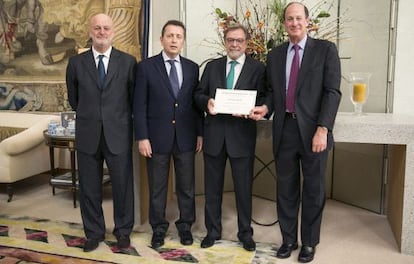Cebrián defends the role of the United States in Spain’s modernization
EL PAÍS chairman receives the First Amendment award for his support of freedom of the press


A 15-year-old boy is waving an American flag as United States President Dwight Eisenhower passes by in his motorcade down Gran Vía. That was in 1959 in Madrid. The boy has grown up to become Juan Luis Cebrián, executive chairman of the media conglomerate PRISA. Cebrián remembered that day as he spoke in Washington D.C. on Friday. It was then that he began to admire the general who had contributed to the demise of fascism in World War II, and who, as president, renewed diplomatic relations with Spain.
“It was the first flag I ever waved in my life and I think it was the only time I made a gesture like that with such candor and enthusiasm.”
The veteran journalist and academic received the First Amendment award at a ceremony held at the home of the Spanish ambassador in Washington D.C., Ramón Gil-Casares. The ambassador and Javier Cremades, an attorney who heads the Spanish Association of the Eisenhower Fellowships, presented the award to Cebrián. The prize honors individuals for their defense and promotion of freedom of the press. The award is named after the First Amendment in the United States’ Constitution. The law urges Congress not to approve any measure that “curtails freedom of expression.”
Cebrián received the First Amendment award at the home of the Spanish ambassador in Washington D.C.
Cebrián spoke in support of the role the United States – and in particular President Eisenhower – played in helping Spain open up after the war. “Eisenhower’s visit to the capital symbolized Spain’s opening to the outside world and fired the starting shot for the modernization of our country,” he explained.
As a founding member of EL PAÍS and a member of the Real Academia Española, the official royal institution responsible for overseeing the Spanish language, Cebrián defended America’s moderation as an example to follow in the practice of democracy in Spain.
Mixing history and memory, and his fascination with American cinema, art and music, the academic offered an interpretation of the relationship between the superpower and the Iberian country. “Naturally, I would have liked the Franco regime to disappear before it did. But I have always felt it was unjust that many on the left reproached the Western powers for normalizing diplomatic relations with Spain despite the dictatorship,” he said.
The academic offered an interpretation of the relationship between the superpower and the Iberian country
Relations with the United States in the 1950s “helped soften the ghetto conditions the dictator had put the country under,” he continued. “They allowed for an exchange between our two people and it helped us be less boorish.
“Roosevelt, Eisenhower and Kennedy are the American presidents my country looked up to as it grew up,” Cebrián explained, adding that he even requested an interview with Eisenhower for a school project.
The ceremony was a celebration of American-Spanish relations. The loss of Spanish colonies in 1898 as America rose to power, and the country’s membership in the Axis Powers under the Franco regime, fed anti-American sentiment on the right in the early part of the 20th century. The relationship between the the Franco dictatorship and the administrations of Eisenhower and his successors heightened that anti-American fever.
Roosevelt, Eisenhower and Kennedy are the presidents my country looked up to”
The event was also a celebration of freedom of the press. John Wolf, president of the Eisenhower Foundation, quoted Nate Silver, one of the most innovative journalists in the United States. “A lot of journalism wants to have what they call objectivity without them having a commitment to pursuing the truth, but that doesn’t work.”
For Cebrián, journalism is telling something that someone doesn’t want to see told,” Cremades said. “If, as Joseph Pulitzer said, nations prosper or decline in step with their media, the work of our honoree is a sign of confidence that Spain still has the moral springs to bounce back from these times.”
Any lessons for Spain from Ike Eisenhower? Cebrián said he envied those leaders who worked “beyond bipartisanship and ideologies for the good of their country and for peace.”
“It was not about consensus, as they say now, but about faith in the system, in its ability to bear reforms, and in the promise of a future couched in democracy,” he explained. The United States has been “an indisputable leader in all of these things” and “it continues to be the best democracy in the world.”
“Which is why today I remember, with this indescribable feeling, my hand in the air waving that American flag as the Eisenhower motorcade passed by. Without me knowing it, it was saying that sooner or later I would be able to enjoy a day like this.”
Translation: Dyane Jean François
Tu suscripción se está usando en otro dispositivo
¿Quieres añadir otro usuario a tu suscripción?
Si continúas leyendo en este dispositivo, no se podrá leer en el otro.
FlechaTu suscripción se está usando en otro dispositivo y solo puedes acceder a EL PAÍS desde un dispositivo a la vez.
Si quieres compartir tu cuenta, cambia tu suscripción a la modalidad Premium, así podrás añadir otro usuario. Cada uno accederá con su propia cuenta de email, lo que os permitirá personalizar vuestra experiencia en EL PAÍS.
¿Tienes una suscripción de empresa? Accede aquí para contratar más cuentas.
En el caso de no saber quién está usando tu cuenta, te recomendamos cambiar tu contraseña aquí.
Si decides continuar compartiendo tu cuenta, este mensaje se mostrará en tu dispositivo y en el de la otra persona que está usando tu cuenta de forma indefinida, afectando a tu experiencia de lectura. Puedes consultar aquí los términos y condiciones de la suscripción digital.








































